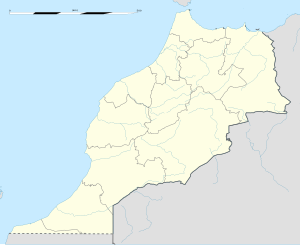Oujda
|
Oujda, Morocco Wejda / ⵡⴻⵊⴷⴰ / وجدة |
|
|---|---|
| location of Oujda in Morocco | |
| Coordinates: 34°41′21″N 1°54′41″W / 34.68917°N 1.91139°W | |
| Country | Morocco |
| Region | Oriental |
| First settled | Roman times |
| Modern city | 994 |
| Elevation | 470 m (1,540 ft) |
| Population | |
| • City | 551,767 |
| • Rank | 10 |
| • Urban | 494,252 |
| Time zone | WET (UTC+0) |
| • Summer (DST) | WEST (UTC+1) |
Oujda (Berber: ⵡⴻⵊⴷⴰ,Wejda ; Arabic: وجدة) is the capital city of the Oriental region of eastern Morocco. It is located about 15 kilometres (9 miles) west of the Algerian border and about 55 km (34 miles) south of the Mediterranean Sea.
There is a difference of opinion on the origin of Oujda's name, a group of researchers suggest that its name is derived from the Arabic word for units (وجدات) in reference to the ambushes carried out by Bashi-bazouks. However, it is likely that the name is linked to the hunt for Sulaiman Al-Chamakh who assassinated King Idris the first by order of the Abbasid Caliphate. They had sent him to kill the King who had established an emirate, independent of the Abbasid Caliphate, in today's Morocco. He poisoned the King before fleeing to the east. He was, however, tracked by the Moors who found and killed him in an area not far from current day Oujda. Ever since this event (which occurred around the same time Oujda became the capital of eastern Morocco) the city has been called Oujda.
There is some evidence of a settlement during the Roman occupation, which seems to have been under the control of Berbers rather than Romans.
Uqba ibn Nafi began the Umayyad-Arab conquest of the region, during the reign of the Umayyad Caliphate, a conquest which was completed in AD 705 by Musa bin Nusayr. The city was founded in 994 by Ziri ibn Atiyya, Berber king of the Zenata tribes. Further additions were made in 1048.
In the mid-11th century, Oujda acquired prominence through its strategic position on the road east from Sijilmasa. Throughout the history of the dynasties of the Muslim West, Oujda played an important strategic role among the Merinids, settled in Fes, in this case as a rear base in their conflict with the Abdalwadids of the Kingdom of Tlemcen.
...
Wikipedia

